Losing a tooth can be a distressing experience, especially when it happens due to decay. If you’re facing this situation and wondering what to do when a rotten tooth falls out, you’re not alone. Many people encounter this dental emergency and feel uncertain about the proper steps to take. Also, if you are not familiar with what to do if temporary crown falls off, you should first calm down and read our temporary crown blog.
Understanding what to do when a rotten tooth falls out can help minimize discomfort, prevent complications, and set you on the path to recovery. What Do They has written a guide that will walk you through immediate actions, follow-up care, and long-term solutions to consider when dealing with a tooth that has fallen out due to decay.
Immediate Steps When a Rotten Tooth Falls Out
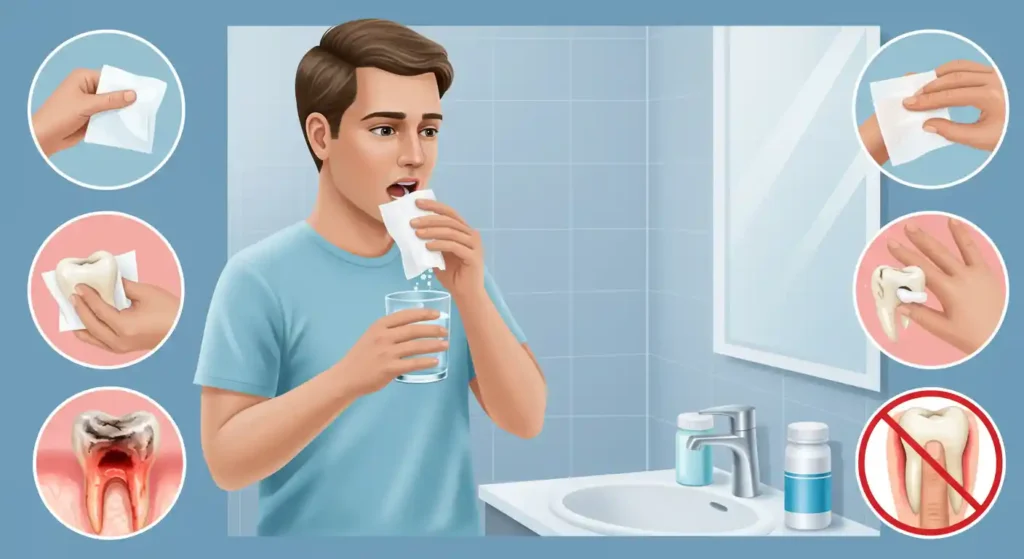
The moments right after a rotten tooth falls out are crucial for proper healing and preventing infection. Knowing what to do when a rotten tooth falls out in these first hours can make a significant difference in your comfort and recovery. Here’s a detailed approach to handle this dental emergency:
- Clean the area gently. Rinse your mouth with warm salt water (half a teaspoon of salt in 8 ounces of warm water). This helps remove bacteria and reduce swelling. Avoid using mouthwash with alcohol as it might irritate the sensitive area where your rotten tooth fell out.
- Control any bleeding. If your gum is bleeding where the tooth fell out, fold a clean piece of gauze and bite down on it for about 10-15 minutes. Most bleeding should stop within this time. If bleeding continues, replace with fresh gauze and apply gentle pressure for another 15 minutes.
- Keep the tooth area clean. Avoid touching the empty socket with your fingers or tongue, which could introduce bacteria. When a rotten tooth falls out, the exposed socket is particularly vulnerable to infection.
- Take over-the-counter pain relief if needed. Medications like ibuprofen or acetaminophen can help manage discomfort after a rotten tooth falls out. Follow the recommended dosage on the package or as advised by your healthcare provider.
What to Do When a Rotten Tooth Falls Out: Next Steps
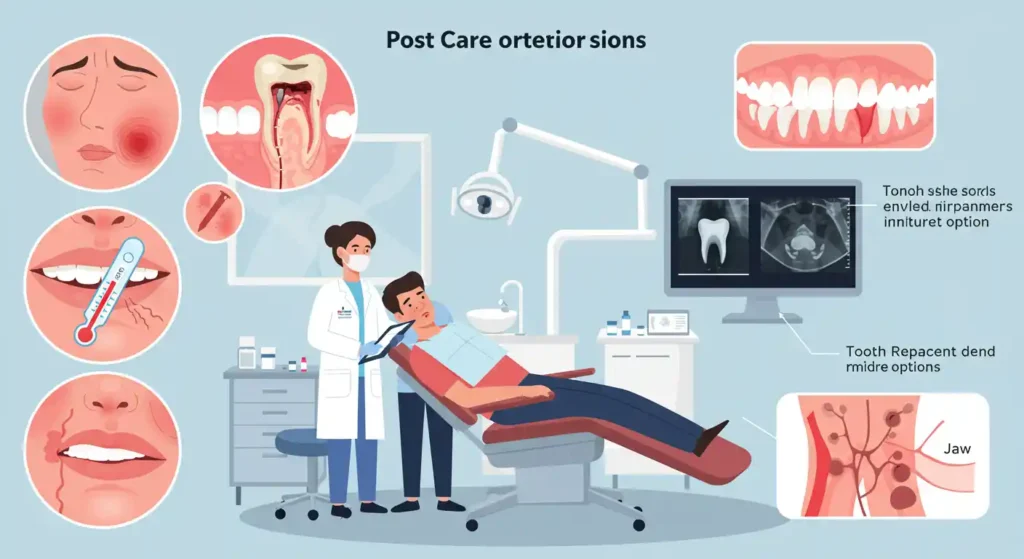
After addressing the immediate concerns when a rotten tooth falls out, it’s important to take proper follow-up actions to ensure complete healing and prevent further complications. The days following this dental issue are critical for your long-term oral health. Here’s what you should do when a rotten tooth falls out to ensure proper recovery:
Contact a Dentist
One of the most important things to do when a rotten tooth falls out is to call a dentist as soon as possible. Even though the tooth is already gone, the area needs proper care and professional attention. Delaying dental care after a rotten tooth falls out could lead to complications or infections that spread beyond the mouth. When you visit, the dentist will:
- Clean the socket properly to remove any debris or infected tissue
- Check for remaining infection or abscess that might need treatment
- Evaluate nearby teeth for signs of decay or damage
- Discuss replacement options suitable for your situation
- Provide guidance on what to do when a rotten tooth falls out to prevent recurrence
Watch for Warning Signs
Being vigilant about potential complications is an essential part of what to do when a rotten tooth falls out. Monitor your condition carefully and be aware of symptoms that might indicate a problem requiring immediate attention:
- Severe, persistent pain that worsens rather than improves
- Swelling that worsens after 48 hours instead of subsiding
- Fever, which could indicate a spreading infection
- Bad taste or smell from the socket, suggesting infection
- Difficulty opening your mouth or swallowing
- Swollen lymph nodes under your jaw or in your neck
These signs may indicate an infection that needs immediate treatment. If you experience any of these symptoms after a rotten tooth falls out, contact your dentist or seek emergency care right away.
Understanding Why Rotten Teeth Fall Out

To better understand what to do when a rotten tooth falls out, it helps to know why this happens in the first place. Tooth decay is a progressive condition that, if left untreated, can ultimately lead to tooth loss. The process typically unfolds as follows:
When teeth decay severely, they become weak and structurally compromised, eventually leading to breakage or falling out completely. Decay happens when bacteria in your mouth create acids that gradually destroy tooth structure. This progressive damage follows a predictable pattern:
- First, acids attack the outer enamel layer, creating small holes or cavities
- The decay then progresses to the softer dentin underneath, which deteriorates more quickly
- Eventually, the decay reaches the inner pulp containing nerves and blood vessels, causing pain and infection
- As the internal structure of the tooth is destroyed, the tooth weakens until it can no longer maintain its integrity
Knowing what to do when a rotten tooth falls out is important, but understanding this process highlights why prevention and early intervention are even more crucial.
Preventing Further Tooth Loss
After experiencing what to do when a rotten tooth falls out firsthand, most people are motivated to prevent similar problems in the future. Taking proactive steps to improve your oral health can save your remaining teeth and avoid the need for extensive dental work. Here’s how to protect your oral health:
- Improve oral hygiene: Brush twice daily with fluoride toothpaste and floss once daily to remove plaque and food particles. Consider using an antimicrobial mouthwash to reduce bacteria. Proper hygiene is the foundation of preventing situations where you need to know what to do when a rotten tooth falls out.
- Visit your dentist regularly: Get check-ups and professional cleanings every six months, or more frequently if recommended by your dentist. Regular visits allow for early detection and treatment of decay before teeth become severely damaged.
- Address tooth decay early: Don’t wait until teeth become severely damaged or painful. Treat cavities promptly when they’re small to prevent extensive damage that might lead to tooth loss.
- Consider diet changes: Reduce consumption of sugary foods and drinks, which feed the bacteria that cause decay. Increase intake of calcium-rich foods to strengthen teeth, and drink plenty of water to rinse away food particles and bacteria.
Replacement Options After a Rotten Tooth Falls Out
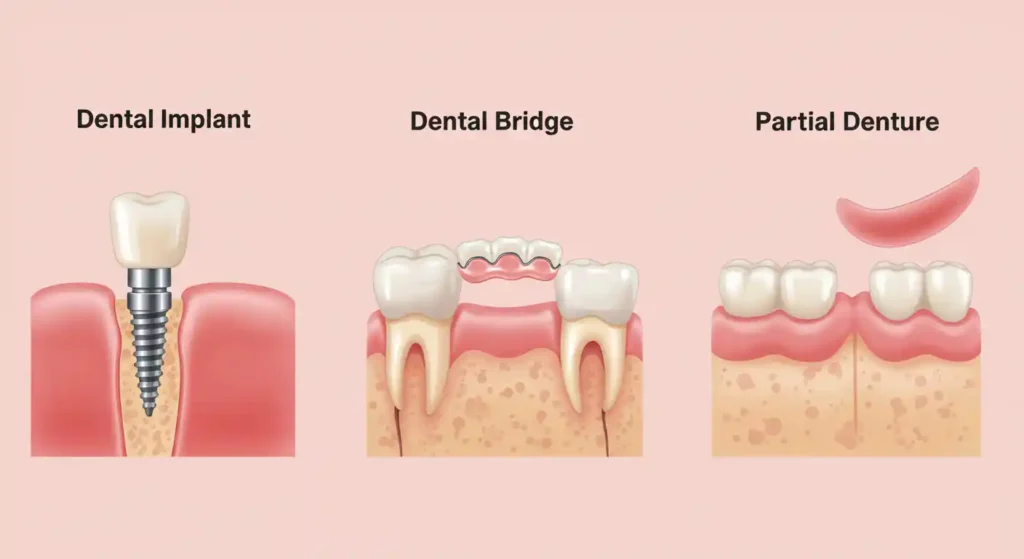
Understanding what to do when a rotten tooth falls out includes knowing your options for replacing the missing tooth. Leaving a gap can lead to shifting of adjacent teeth, bite problems, and bone loss in the jaw. Several replacement options exist, each with their own advantages:
- Dental implants: Titanium posts surgically placed in the jawbone, topped with a crown. These are the most natural-looking and functioning replacement option, providing stimulation to the jawbone to prevent bone loss. Implants are a permanent solution to consider when deciding what to do when a rotten tooth falls out.
- Bridges: False teeth attached to neighboring healthy teeth on either side of the gap. This option is less invasive than implants but requires altering adjacent teeth. Bridges provide good functionality and aesthetics for those figuring out what to do when a rotten tooth falls out.
- Partial dentures: Removable replacements for missing teeth that clip onto remaining natural teeth. These are less expensive but less stable than fixed options. Partial dentures are sometimes recommended as a temporary solution while deciding what to do when a rotten tooth falls out.
Your dentist will recommend the best option based on your oral health, budget, and preferences. The location of the lost tooth, condition of surrounding teeth, and overall oral health will all factor into this recommendation.
When to Seek Emergency Care
While knowing what to do when a rotten tooth falls out typically involves scheduling a regular dental appointment, sometimes urgent care is necessary. Understanding when your situation requires emergency attention is crucial for your health and safety. Seek emergency dental care if you experience:
- Uncontrollable bleeding that persists despite applying pressure
- Severe, debilitating pain that doesn’t respond to over-the-counter pain relievers
- Signs of serious infection like difficulty breathing or swallowing
- Significant facial swelling, especially if it’s spreading or affecting your eyes
- High fever accompanying dental pain or after a rotten tooth falls out
These symptoms could indicate a serious infection that may spread to other parts of your body if not treated promptly. When dealing with what to do when a rotten tooth falls out, never ignore these warning signs.
So the Answer to What to do When a Rotten Tooth Falls Out is…
Properly addressing what to do when a rotten tooth falls out leads to better outcomes for your overall oral health. With the right approach to immediate care and follow-up treatment, most people recover well and can prevent further tooth loss. Here’s what you can expect for the future:
Taking appropriate action when a rotten tooth falls out helps preserve your remaining teeth and oral structures. With proper treatment and improved dental care habits, you can maintain a healthy mouth despite this setback. Remember that replacing missing teeth isn’t just about aesthetics—it helps maintain proper chewing function, preserves facial structure, and prevents remaining teeth from shifting into the empty space.
The experience of dealing with what to do when a rotten tooth falls out can serve as a powerful wake-up call about the importance of oral health. Use this experience as motivation to improve your dental care routine, address any remaining dental issues before they worsen, and maintain regular dental visits. With the right care and attention, you can enjoy better oral health for years to come.

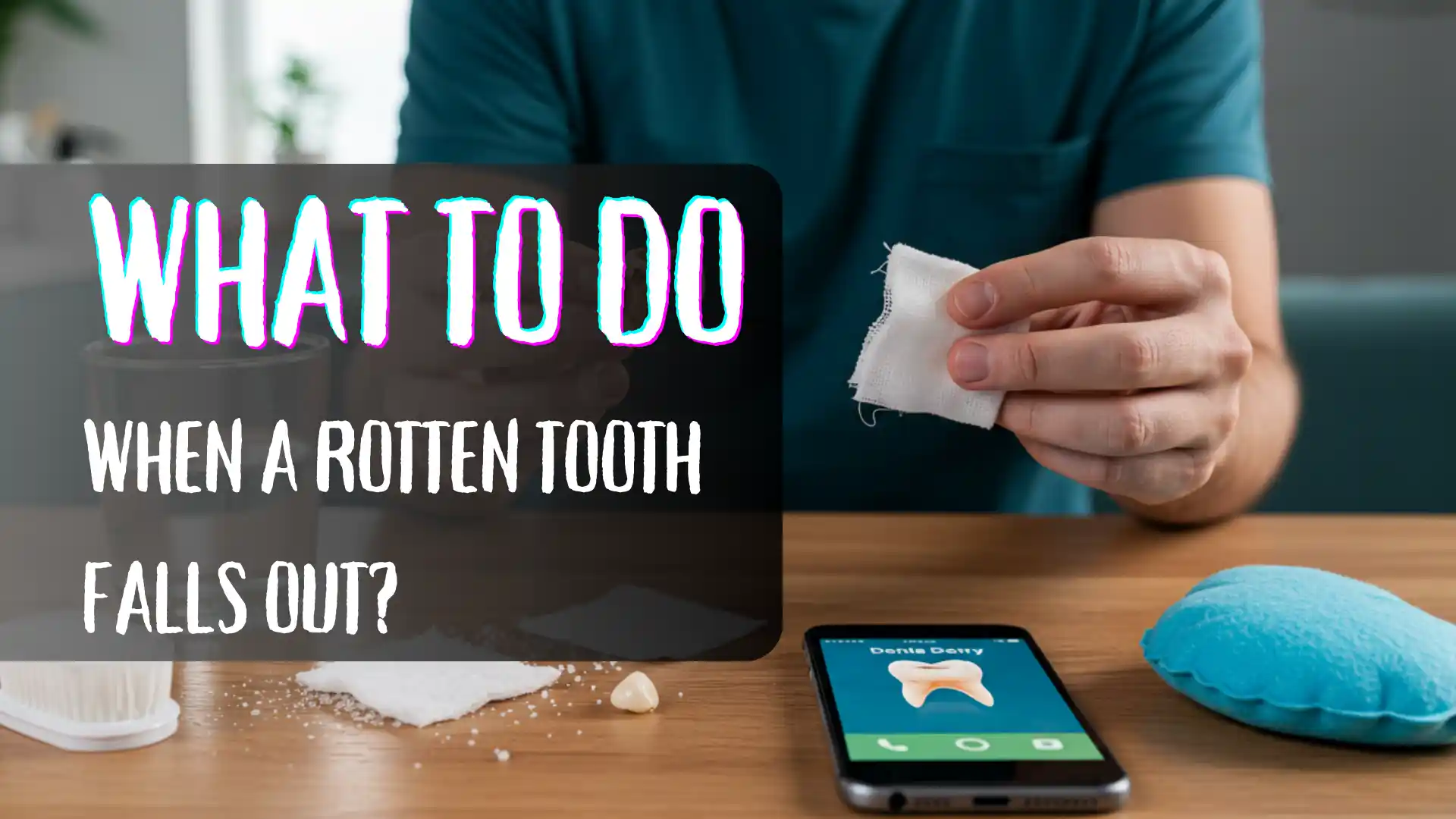


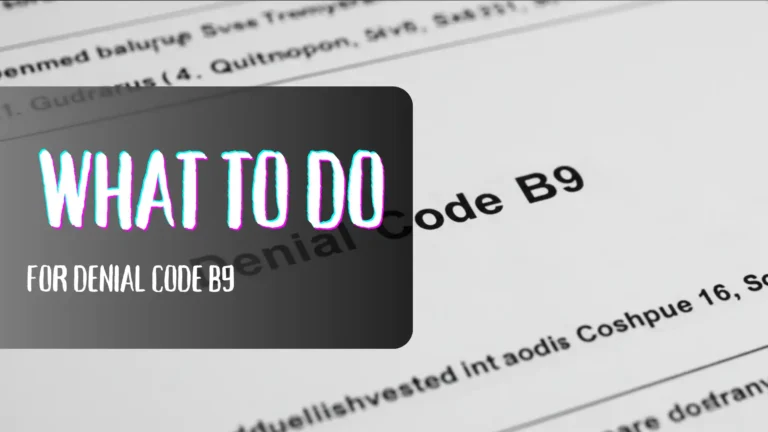



1 Comment